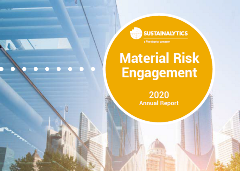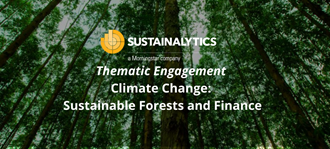Nutrien Proves the Socio-Economic Impact of Its Indigenous Engagement Strategy
Read how Nutrien, the world’s largest provider of crop inputs and services, used Sustainalytics' Socio-Economic Impact Report to quantify the social and economic impact of their sustainability efforts, particularly supplier diversity efforts.
Banks Embrace Corporate Culture as Change Agent
Corporate culture is not automatically positive, and elements of a company’s culture may provide certain benefits or disadvantages to a firm’s competitiveness. When acknowledged, corporate culture can be used as a tool to drive better business outcomes and manage conduct and compliance risk. Our discussions with companies show that corporate culture can have a dominant effect and influence behaviour over and beyond stated company policies and programs.
2020 Material Risk Engagement Annual Report
Material Risk Engagement helps investors promote and protect their long-term value by engaging with high-risk companies on their financially material ESG issues. This inaugural Material Risk Engagement annual report covers ten months since its launch in March 2020. Read the report to learn more about:
Governance in Brief – April 15, 2021
Credit Suisse has announced far-reaching changes following the collapse of U.S. hedge fund Archegos Capital Management and UK supply chain finance company Greensill Capital. Archegos’ failure to meet margin commitments will cost Credit Suisse USD 4.7 billion, with the lender having liquidated USD 10 billion worth of funds managed with Greensill.
Bringing Investors and Companies Together to Address the Climate Change Crisis
As Earth Day is around the corner on the 22nd of April, the Biden Administration is to convene a global climate summit. Following a historical precedent for several such events, since its inception in 1970, including signing the landmark Paris Agreement . We have seen positive developments since the Paris Agreement; societal actions to address some of the root causes of climate change have yet to suppress the negative trends . Historically, active ownership on climate change has focused on direct emissions from highly exposed sectors, such as fossil fuel and utility companies. However, the more complicated, less direct aspects of climate change have seen limited progress. Tackling such issues will see a strong need for collaboration from both countries and other key sectors, in particular, banking and finance. Banks are key to support this transformation; facilitating economic activity for positive change throughout the entire value chain is key.
Sustainability-Linked Loans 2021: The COVID-19 Effect, ESG Ratings & Continued Popularity
The sustainable finance market has seen an exponential increase in size and activity in recent years. Innovative offerings such as green, social, and sustainable bonds, green and sustainability-linked loans (SLLs), and most recently sustainability-linked bonds, have contributed to the market’s incredible growth. In 2020, boosted by varied financial needs and mainstream recognition of environmental, social and governance (ESG) parameters, global sustainable debt capital surpassed US$700 billion, a 30% increase compared to 2019. Part of this capital was channelled towards tackling the effects of COVID-19 as government agencies, supranational bodies and corporates borrowed money to support areas most affected by the pandemic, such as healthcare. This shift in fund usage in 2020 resulted in the rapid growth of social bonds and a commendable first year for sustainability-linked bonds.
Deforestation and Biodiversity Loss Highlight the Need for a Better Normal
The world is aching for a return to normality after a year (and still counting) of news bulletins being dominated by the COVID-19 pandemic; Earth Day 2021 should serve as a stark reminder that we cannot go back to business-as-usual. We must address the vast environmental challenges facing humanity, such as climate change, loss of biodiversity, extreme weather and issues related to water.
Tracking the Progress on Gender Equality through Sustainable Finance
A key result of achieving UN SDG 5 - Gender Equality is global economic development. However, as women globally were disproportionately impacted by the COVID-19 pandemic, the financing of activities that contribute to the empowerment and socio-economic advancement of women and girls will need to be accelerated to meet the goal by 2030. One option for creating targeted gender investment is the development and issuance of Gender Bonds that specifically support the advancement, empowerment, and equality of women.
UNICEF Collaborates with Sustainalytics to Highlight Children’s Rights Issues for Investors
While child labor remains a serious problem across industries and countries, it is only one part of the overall issues pertaining to children’s rights; companies and investors should recognize the scope and relevance of this topic.
Governance in Brief – April 01, 2021
The UK Government has launched a public consultation on proposed measures to improve the audit and governance regimes of public interest entities. The process was prompted by a spate of corporate failures such as those seen at Carillion and Thomas Cook. The proposals address audit purpose and scope, auditing market competitiveness, director accountability, and the creation of a new regulator with increased powers
Personal Products and the New Ethics of Product Naming
Over recent years, personal product (PP) companies have faced an increasing demand for more inclusive product governance – from formulations to labels – and marketing that reflects the diversity of consumers. To grow sustainably within their communities and stay relevant for their target customers, such companies need to create value for society proactively. Some of the major players in this industry have already started paving the way for others.
Governance in Brief – Mar 25, 2021
Starbucks shareholders revolt over executive pay Starbucks faced a rare rebuke at its 2021 AGM, where its advisory say-on-pay resolution was rejected following opposition by 53% of votes cast. The executive pay proposal included two special one-time retention awards granted in December 2019
Investing in Companies with Positive Momentum in ESG Risk and Economic Moat Development
In Sustainalytics’ paper, Combining ESG Risk and Economic Moat,[i] we examined the effect of combining the two metrics, showcasing the benefits of higher returns and lower downside risk. More specifically, investing in companies with negligible/low ESG risk and wide economic moats was advantageous for creating alpha over the past four years.
A Reflection of Water Reporting Around the World
On World Water Day, we reflect on global companies’ dedicated attention to this most vital resource. Water risks are related to nine of the top ten worst global risks in the Global Risk Report published by the World Economic Forum, with risks likely to increase due to climate change. As global water resources contend with increased stress, companies are expected to face growing scrutiny of their water use due to the significant impacts that it can have on resource security and the health of ecosystems. This scrutiny may manifest in business risk, including limits placed on water withdrawal, increasing costs and heightened regulations.
















.tmb-thumbnl_rc.jpg?Culture=en&sfvrsn=d0660f9e_1)